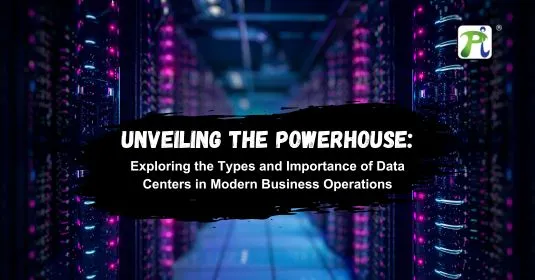We Will Get Back To You As Soon As Possible


A data center is a facility that is specifically made to accommodate multiple computer systems and their related hardware and infrastructure. In modern business operations, they play a crucial role in providing a secure and efficient environment for storing, processing, and managing large amounts of data.
As technology becomes more critical in the business world, data centers have become crucial for maintaining operations and safeguarding sensitive information. At the end of the day, data centers are an essential component of the development and prosperity of modern businesses.
There are several different types of data centers, each with its own unique features and functions. They come in different sizes and types, ranging from small server rooms in offices to massive facilities spread over multiple buildings.
The enterprise data center is a common example; it is owned and operated by a single organization. These facilities are built to process massive amounts of data while maintaining the highest standards of safety and dependability.
Another type is the colocation data center, which allows multiple organizations to share the same facility and resources. This can be an economically viable solution for businesses that need access to a data center but cannot build or maintain their own.
A third type of data center is the cloud data center, which is operated by a cloud service provider and allows businesses to access computing resources and storage on a pay-per-use basis. Cloud data centers can be public, private, or hybrid, depending on the level of control and customization required by the business. Additionally, there are modular data centers, which are prefabricated and can be quickly deployed to remote locations or areas with limited space. Each type of data center has its own advantages and disadvantages, and businesses must carefully evaluate their needs and budget before selecting a data center solution.

12_Reasons_Why_Enterprises_Should_Adopt_Cloud
Overall, the importance of data centers in modern business operations cannot be overstated. With the constant advancement of technology, the need for data centers is on the rise. Therefore, it is crucial for organizations to carefully assess their data center requirements and available options. Whether it's an enterprise data center or a colocation facility, choosing the right type of data center can have a significant impact on a business's operations and success.
The components housed in a data center require careful maintenance to ensure they remain operational and efficient. Environmental factors such as temperature, humidity, and air quality must be closely monitored and controlled, as even the slightest fluctuation can cause damage to sensitive equipment. Backup power sources are also installed as a precaution against power outages or other interruptions that could disrupt operations. For example, a large e-commerce company may choose to invest in its own enterprise data center to ensure maximum control and security over its operations. On the other hand, a smaller startup may opt for a colocation facility to save on costs and benefit from the shared resources and expertise of the facility's provider. In either case, regular maintenance and monitoring are crucial to ensuring the smooth operation of the data center and the success of the businesses it supports.
In conclusion, Data centers continue to play a crucial role in the digital landscape as technology evolves. They enable businesses to store and process vast amounts of data at high speeds, facilitating smoother and more responsive operations. As such, data centers are set to continue to grow and evolve to meet the increasing demands of today's digital-driven world.
Questions? We're here to help.
©2025 Pi DATACENTERS® Pvt. Ltd. All rights reserved
